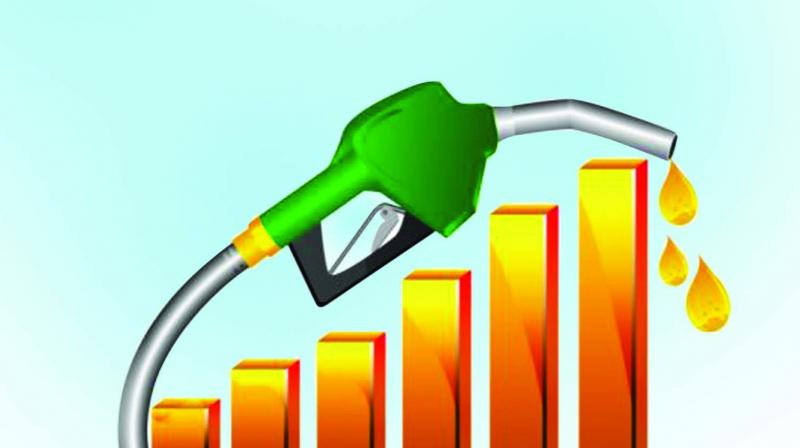Digital Zeitgeist – Skyrocketing Fuel Prices Amid Global Oil Resurgence: A Forecast of Turbulent Waters Ahead
As global oil prices ascend to a 10-month peak with Brent crude breaking through the $95-a-barrel threshold, an undeniable atmosphere of uncertainty and apprehension envelops the international geo-political and financial landscape. This surge, intensified by Saudi Arabia and Russia’s orchestrated production cuts and deteriorating US shale output, poses a grave warning of a looming economic tempest. This exposition delves deep into the forces steering this crisis, and delineates the potential repercussions on the world stage, from inflation spikes to heightened geo-political tensions.
Catalysts Behind the Surging Oil Prices
At the heart of this upheaval lies OPEC+’s meticulous strategies. Following Russia’s incursion into Ukraine in February 2022, the oil market experienced a roller-coaster trajectory, peaking at an alarming $120 per barrel in June and later stabilising at a slightly over $70 as of May this year. The OPEC+ titans, Saudi Arabia and Russia, spurred a fresh wave of ascension by limiting production earlier this August, a manoeuvre critiqued heavily by the West as an attempt to manipulate prices.
US oil circumstances further fuel the fire, as the US Energy Information Administration recently disclosed a third successive month of dwindling output from prominent shale-producing areas, slumping to its nadir since May. Consequently, the globe finds itself tiptoeing around the ominous $100 per barrel mark, a threshold that significantly influences the inflation rates worldwide.
The UK’s Fuel Conundrum: An Unyielding Upward Trend
The ramifications of this burgeoning crisis resonate profoundly within the UK, as average fuel costs catapult to £1.55 per litre for petrol and £1.59 for diesel, a substantial leap from the May statistics of £1.44 and £1.53 respectively. These figures emanate from an intricately woven tapestry of factors including the dipping pound, altered exchange rates, and the pivotal role of crude oil as the quintessential fuel component.
The RAC and AA motoring groups, amidst this escalating scenario, foreshadow a stringent period for UK drivers. “The symbolically important $100 [a barrel of oil] mark is now being considered once more,” remarks Sophie Lund-Yates, a preeminent analyst at Hargreaves Lansdown, signalling a strenuous phase fraught with inflationary repercussions.
The Echoes of Inflation and Economic Aftermath
The present circumstances unfailingly echo the dread of inflation, a phenomenon that soared unrestrainedly in 2022, albeit showing signs of deceleration in recent times. Yet, with the UK’s inflation sustaining high at 6.8%, the escalating oil prices threaten to revive this economic spectre, pushing households and businesses into a vortex of escalating expenses and rising product prices. The ensuing data release from the Office for National Statistics (ONS) this Wednesday stands as a crucial determinant of the UK’s economic trajectory amidst this turmoil.
Geo-Political Repercussions and Global Dynamics
On a broader spectrum, the current oil landscape is reshaping global dynamics, with Saudi Arabia manoeuvring to maintain high oil prices to nurture its economic diversification endeavours. Simultaneously, allegations against OPEC’s market manipulations by Western powers evoke a landscape of strained relations and potential geopolitical friction.
Saudi Energy Minister, Prince Abdulaziz bin Salman, staunchly advocates OPEC+’s restrictive policies, emphasising a need for ‘light-handed regulation’ to mitigate market volatility. The defence, while illustrating Saudi Arabia’s economic strategies, unfurls a canvas of impending geopolitical negotiations and alignments, possibly altering the global power equilibrium.
The Road Ahead: Electric Vehicles in the Limelight
As traditional fuel prices skyrocket, electric vehicles (EVs) emerge as a beacon of hope. The AA articulates this sentiment, highlighting the diminished impact on EV users amidst the fuel price uproar. “The drivers now beginning to feel happier are those with electric cars,” avers Luke Bodset, the AA’s spokesperson. This narrative paints a promising future for the EV sector, as they seemingly offer a haven from the impending financial tempest, spotlighting a pivotal shift in consumer preferences and possibly ushering a greener future.
Conclusion: Navigating a Foreboding Horizon
As the global oil landscape undergoes a dramatic and unsettling metamorphosis, the undercurrents of apprehension and uncertainty infiltrate nations, governments, and households alike, casting a long shadow on the economic horizon. The abrupt surge in oil prices, propelled by geopolitical manoeuvrings and restrictive supply strategies of dominant oil-producing nations, reverberates ominously, prompting serious contemplations of what lies ahead in this seemingly destabilised marketplace.
The currents of fear and anxiety are undeniably present as we venture into this turbulent phase. Individuals and businesses find themselves on unstable ground, grappling with the implications of a spike in daily living costs and operational expenditures. Moreover, the geopolitical theatre is now a space of intensified scrutiny and speculation, as the world attentively watches the actions of OPEC+ and other significant entities, whose decisions bear the weight of potential international discord and economic fluctuation.
There is no denying that the road ahead is fraught with challenges that hold substantial economic and geopolitical ramifications. In a scenario where oil prices threaten to breach symbolic thresholds, nations are nudged towards a junction of pivotal decisions, ones that may redefine international relations and economic strategies for years to come.
Disclaimer: The views and opinions expressed in this article are those of the author and do not necessarily reflect the official policy or position of GPM-Invest or any other organisations mentioned. The information provided is based on contemporary sourced digital content and does not constitute financial or investment advice. Readers are encouraged to conduct further research and analysis before making any investment decisions.

